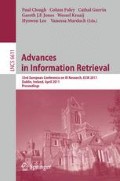Abstract
The User-over-Ranking hypothesis states that rather the user herself than a web search engine’s ranking algorithm can help to improve retrieval performance. The means are longer queries that provide additional keywords.
Readers who take this hypothesis for granted should recall the fact that virtually no user and none of the search index providers consider its implications. For readers who feel insecure about the claim, our paper gives empirical evidence.
Access this chapter
Tax calculation will be finalised at checkout
Purchases are for personal use only
Preview
Unable to display preview. Download preview PDF.
References
Balasubramanian, N., Kumaran, G., Carvalho, V.R.: Exploring Reductions for Long Web Queries. In: Proceedings of SIGIR 2010, pp. 571–578 (2010)
Barker, K., Cornacchia, N.: Using Noun Phrase Heads to Extract Document Keyphrases. In: Proceedings of AI 2000, pp. 40–52 (2000)
Bendersky, M., Croft, W.B.: Discovering Key Concepts in Verbose Queries. In: Proceedings of SIGIR 2008, pp. 491–498 (2008)
Hagen, M., Stein, B.: Capacity-constrained Query Formulation. In: Proceedings of ECDL 2010, pp. 384–388 (2010)
Hagen, M., Potthast, M., Stein, B., Bräutigam, C.: The Power of Naïve Query Segmentation. In: Proceedings of SIGIR 2010, pp. 797–798 (2010)
Huston, S., Croft, W.B.: Evaluating Verbose Query Processing Techniques. In: Proceedings of SIGIR 2010, pp. 291–298 (2010)
Kumaran, G., Allan, J.: Adapting Information Retrieval Systems to User Queries. Information Processing and Management 44(6), 1838–1862 (2008)
Lease, M., Allan, J., Croft, W.B.: Regression Rank: Learning to Meet the Opportunity of Descriptive Queries. In: Proceedings of ECIR 2009, pp. 90–101 (2009)
Pass, G., Chowdhury, A., Torgeson, C.: A Picture of Search. In: Proceedings of Infoscale 2006, article number: 1 (2006)
Stein, B., Hagen, M.: Making the Most of a Web Search Session. In: Proceedings of WI-IAT 2010, pp. 90–97 (2010)
Tunkelang, D.: Faceted Search. Morgan & Claypool Publishers (2009)
Author information
Authors and Affiliations
Editor information
Editors and Affiliations
Rights and permissions
Copyright information
© 2011 Springer-Verlag Berlin Heidelberg
About this paper
Cite this paper
Stein, B., Hagen, M. (2011). Introducing the User-over-Ranking Hypothesis. In: Clough, P., et al. Advances in Information Retrieval. ECIR 2011. Lecture Notes in Computer Science, vol 6611. Springer, Berlin, Heidelberg. https://doi.org/10.1007/978-3-642-20161-5_50
Download citation
DOI: https://doi.org/10.1007/978-3-642-20161-5_50
Publisher Name: Springer, Berlin, Heidelberg
Print ISBN: 978-3-642-20160-8
Online ISBN: 978-3-642-20161-5
eBook Packages: Computer ScienceComputer Science (R0)

